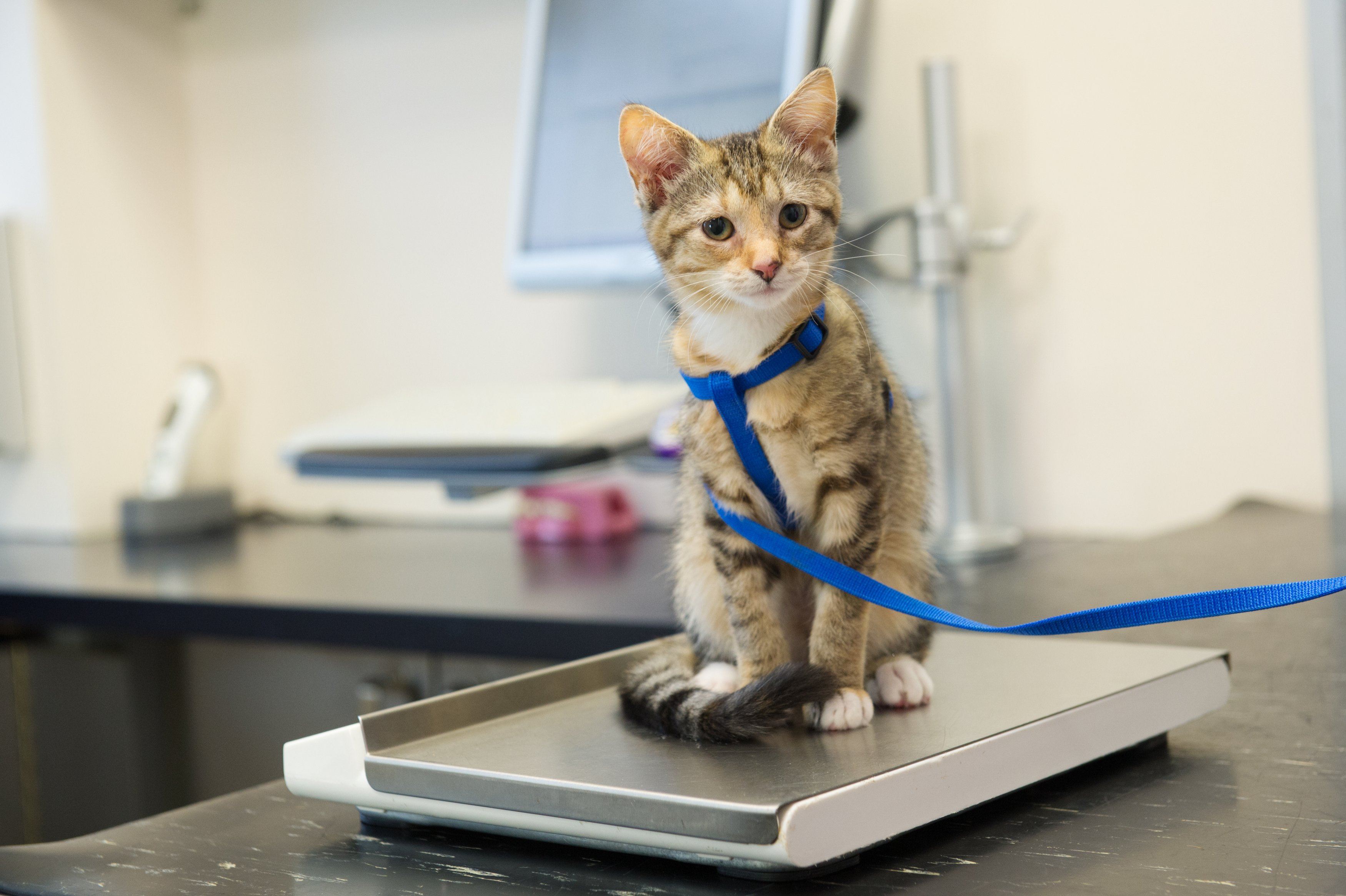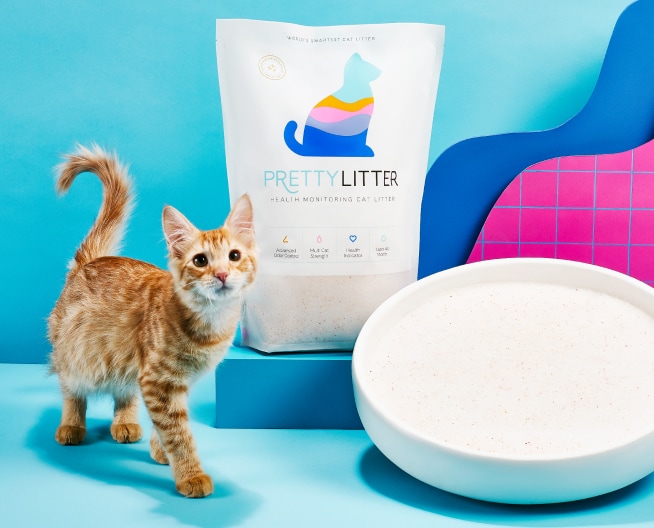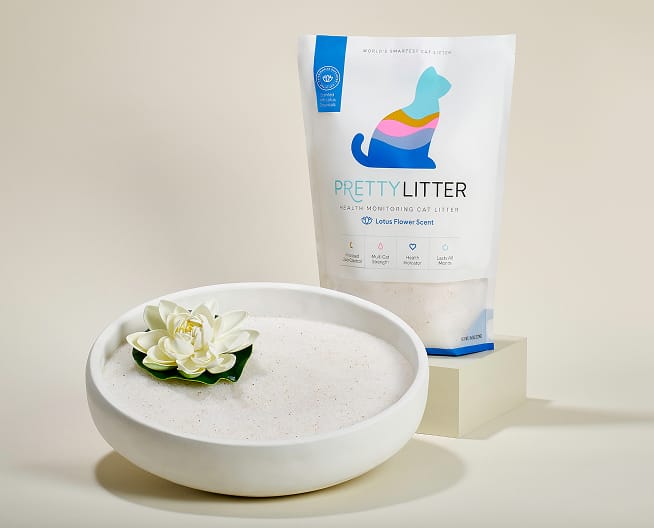August 22, 2017 |6 min read |Veterinarian Reviewed
How to Keep Your Cat at a Healthy Weight

Written by

Updated June 2, 2023
One of the questions we get a lot here at PrettyLitter is, "How much does the average cat weigh?” If you are worried that you have an overweight or underweight cat on your hands, there are several weight control things you can do as a cat owner to get your furry feline back to a healthy weight range or of average cat weight. Remember, as cat parents, it is your duty to keep your cat's weight at an optimal level. So let's talk about pet obesity prevention, healthy cat weight, weight loss, and weight gain management for a minute.
How Much Should My Cat Weigh?

Like people, each domestic cat is different. Some breeds tend towards a smaller frame, while others are naturally long, tall, or squatty. There is no “ideal cat weight” since every breed varies.
However, most healthy domestic indoor cats tend to hover around the 8 - 10 pound average cat weight range. If your cats weight exceeds 12 pounds, he's likely overweight. If you have an overweight cat, talk to your vet to see what you can do to get your feline back to a healthy weight range.
A good way to judge your cat’s health is by checking his belly fat for excess weight. Have your cat stand up on all fours, preferably on a counter or table where you can easily look at his torso at eye level. On a cat of healthy weight, the belly shouldn’t dip below the elbows, meanwhile, an underweight cat may have a visible spine and ribcage.
While there are some exceptions to this rule - like the infamously cute Munchkin cat breed - it’s a good body condition health barometer for the vast majority of domestic indoor cats to tell if you have an obese cat. If you’re still not sure about your cat’s weight, take him for a visit to the vet to discuss weight management.
Is My Fat Cat at Risk?

If your cat has excess weight, he's at high risk of many health problems. As a cat owner, it is your job to maintain weight control in order to avoid potential health issues down the road.
Cat obesity can lead to a number of health hazards, including joint arthritis, bladder inflammation leading to urinary blockage, and feline diabetes, says Dr. Geoff DeWire, a graduate of the UC Davis School of Veterinary Medicine and recipient of the Pfizer Clinical Achievement Award for Excellence.
While a 13 or 14 pound cat may be cute in all his fluffy, squishy goodness, he’s actually extremely overweight or considered an obese cat. For example, if your cat’s ideal weight is 8 pounds but he’s actually 10 pounds, then he’s carrying around an additional 25% of his body weight.
In human terms, that would be the equivalent of a 180 lb adult man putting on an additional 45 pounds. And you probably know what your doctor would say about that - time for a change.
Is My Cat Underweight?
Underweight cats may have a visible rib cage or spine and a lack of muscle tone. They require a balanced diet in order to gain weight and maintain good health. If you notice your cat appears underweight, we advise cat owners to work with their vet to control weight and address the cat's condition before serious health problems arise.

How Can I Help My Cat Lose Weight

Helping your cat lose weight is a lot like helping a person do healthy weight loss. It all comes down to two key components: cat's diet and exercise.
Start by finding a healthy brand of cat food that includes meat and vegetables in its top five ingredients. Healthy options include chicken, liver, salmon, duck, carrots, peas, and sweet potatoes.
Next, make sure you’re measuring your cat’s portions to moderate calories. While it’s tempting to just fill up the bowl and let your little guy be the judge, he’s just as bad at stopping himself from indulging as we humans are.
Take a look at the portion guide on your cat’s food packaging. Find your cat’s ideal weight and serve him up a portion that’s right for the weight he should be, not the weight he is currently. If after about 4 to 6 weeks you don’t see a change in your cat’s weight, you may need to reduce his portion a little more for fewer calories into his diet. You can also use a pet weight calculator to estimate your pet’s daily calorie needs and body condition score.
Finally, get your furry friend on the treadmill. In cat terms, this usually means whipping out the laser pointer. Schedule your play time every day and commit to it like you would an important appointment - because that’s absolutely what it is.
Help your cat burn off a few additional calories by running him around your living room. You can even get creative and set up a track over the couch, under the coffee table, and up the cat tree. Keep him guessing and you’ll both have a blast. (And yes, posting your cat’s funny workout on YouTube is encouraged.)
Maintaining a healthy cat weight doesn’t have to be a challenge. Figure out the healthy portion your cat needs and add a bit of exercise into his daily routine. He’ll still get to nap, lounge, and watch the birds, but he’ll be doing so in a healthy body that you’ll both get to enjoy for years to come.
Sources:









